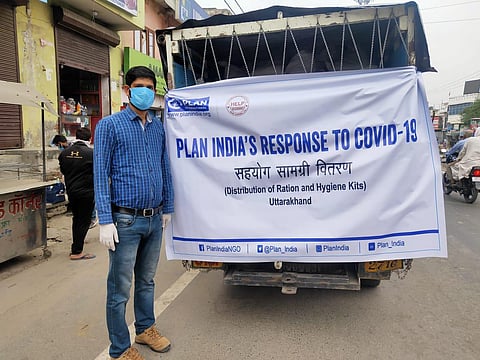

With the country’s energy and resources currently occupied in battling COVID-19, those already infected with the ‘big three’ -- AIDS, tuberculosis and malaria -- are suffering due to limited access to medicines amid the unprecedented lockdown.
However, health workers from Plan India under the project 'Ahana' are providing a helping hand. To prevent mother-to-child transmission of AIDS, they have been relentlessly braving the lockdown to ensure antiretrovirals are delivered to mothers in need.
When her turn arrives to deliver medicines to HIV-positive mothers in Uttar Pradesh’s Moradabad, Saifi doesn’t think twice before leaving her two minor sons behind. “I have to be extra careful because I have two minor boys at home. I wear masks, gloves and use sanitizers while venturing out. Working in the red zones makes our work a little difficult as now a 10-minute journey takes over 30 minutes,” she said.
When asked why she took the big risk, she said, “Ma hoon ghar ka, sab ka khayal rakhna padta hai aur zarurat pade toh desh ka bhi (As a mother, it is required of me to take care of the house, family and when necessary, the country too).
In India, as of 2018, over 21.4 lakh people were suffering from the deadly HIV. While the number of parent-to-child transmissions has fallen by around 40 per cent in the last eight years, girls still account for two-thirds of all adolescent HIV infections. The Centre’s goal to eradicate mother-to-child transmission by 2020 has been hit by the COVID-19 crisis.
Plan India’s project Ahana is a national programme working in tandem with the National AIDS Control Organisation (NACO) to prevent parent-to-child transmission among women in most marginalized communities in India. A community of 358 field staff and volunteers have so far reached out to 12530 families in need.
For 28-year-old Muhammad Khalid, the most important part of his job is to maintain the confidentiality of women suffering from HIV. “Since people aren’t stepping out much due to the lockdown, the presence of anyone outside draws a lot of attention. For us, the most important thing is to deliver the medicines safely and clandestinely,” he said.
The project began in 2015 and is now spread across 14 states in the north and northeast of India to serve as a bridge between HIV patients and HIV drugs during this crisis. The health workers collect medicines that will last for a month from the centre and deliver them to mothers in need so that they don’t have to step out at all. The NGO has over the months gone out of its way to help lactating mothers and their newborns.
“We help expecting mothers infected with HIV in whatever way we can. We have helped with deliveries as well as taking care of the newborns. We also help HIV patients who can’t step out of their houses due to the lockdown,” said Roopkatha Chakraborty, a health worker from Assam’s Karimganj.
Roopkatha has been helping expecting mothers in two districts of her state. “We are health workers. No matter how bad the situation gets outside, we have to serve those in need,” she asserts.
As the frontline health workers continue to be a part of the nation's fight against HIV in such troubled times, they are also at a higher risk of contracting COVID-19. “The foot soldiers’ health is also crucial for us. Ergo, we are providing them with adequate PPEs and sanitisers. We have also covered COVID-19 under the health insurance,” the NGO maintains.